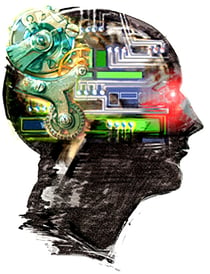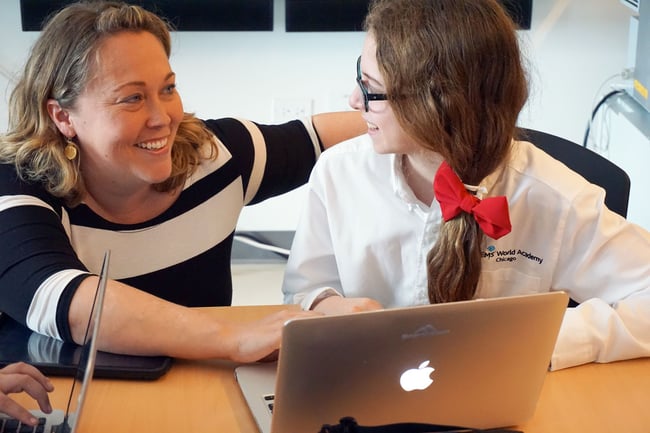CELEBRATING TEACHERS IN AN ERA OF ARTIFICIAL INTELLIGENCE
June 1, 2015 Mr. Thomas Steele-Maley GEMSinnovation, academics, Technology, teachers

We are at a great turning point in education, one where increasing social and political pressures are making it harder for teachers to do their jobs. Technology and the glimpses of artificial intelligence (AI) now arriving on the shores of education have shaken the foundation of a 100-plus-year-old system of schooling. As an example, a recent blog-post by Philip McCrea covering the myths of blended learning was less about blended learning and more about the politics and fear of teachers being replaced by machines. This is an understandable argument. Educational technology is a complicated reality for schools and most teachers are caught in the middle of a dysfunctional deliberation on what role they and technology should play in education. It's time to empower teachers to adapt to a technological landscape that has fundamentally shifted the world in which they and their students now live. This requires teachers to be directly involved in co-creating brave, innovative and visionary approaches to education. These approaches will inevitably need to balance tradition and innovation while also illuminating a clear path toward teachers' new roles as vital knowledge workers, managers and leaders.
The June 2015 issue of the Harvard Business Review (HBR) has salient articles on the transformation of knowledge-workers in a new landscape of automation and AI. The issue is especially important for the educational sector because as educational technologies proliferate and flood the schools market, they are not always paired with a more significant discussion of new visionary practices in education - from new school designs to classroom teaching. The result of this often leaves teachers without the power to adapt to new technologies that can make them stronger teachers.
The HBR article by Thomas Davenport and Julia Kirby titled Beyond Automation sets the stage for how knowledge - workers (teachers) might reframe their views on the era of AI and propel themselves forward into a new vision of creative work and success. Davenport and Kirby suggest,
What if, rather than asking the traditional question—What tasks currently performed by humans will soon be done more cheaply and rapidly by machines?—we ask a new one: What new feats might people achieve if they had better thinking machines to assist them?

Teachers are essential and it is undeniable that at GEMS Education we celebrate, and empower them. Part of this empowerment is enabling our teachers to consistently innovate their craft. For instance, GEMS World Academy -Chicago will employ steps toward AI for certain mathematics instruction next year. This integration is not a replacement of teachers. Using tools like Knewton and The Wolfram Technology System will embolden teachers to cultivate inquiry, creativity and experiential learning in ever increasing ways across the curriculum while knowing that the essential skills of mathematics are mastered for each child.
Our teachers are much more than deliverers of rote content. They are involved in an enormous range of innovative educational practices that are setting the stage for their growth as knowledge-workers and serving their students growth as learners. They are consistently thinking about how technology can assist them in capturing and mapping the world through Field Studies, and how they might ensure that the youngest learners are adept in navigating and creating in virtual learning environments. They support student understanding of social media and "Making", and how connected learning can support them in collaborating with peers from across the world. They open the doors to a critical understanding Internet of Things for students through the design of robotics, writing code and building electronics to solve problems and innovate in a data-filled world. They are remaking themselves as they enter these educational environments with technology.
It is vital to celebrate teachers in an era of artificial intelligence. Technology will and should play an ever-increasing role in education. As this happens, teachers will and should co-create the next episode of education through their design and innovations. As essential parts of our cultural fabric, we owe it the world to ensure that teachers are enabled and propelled into roles no machine can do. The outcome will be a completely new educational system that adapts and uses technology instead of one that reacts to technology and underprepares a generation.
Further Reading:
Papert, S. (1980) Mindstorms: Children, Computers and Powerful Ideas
Thomas, D. & Seely Brown, J. (2011) A New Culture of Learning
Thompson, C. (2013) Smarter Than You Think: How Technology is Changing our Minds for the Better
Zuboff, S. (1990) In the Age of The Smart Machine
Brynjolfsson, E. McAfee, A. (2014) The Second Machine Age :Work, Progress and Prosperity in a Time of Brilliant Technologies